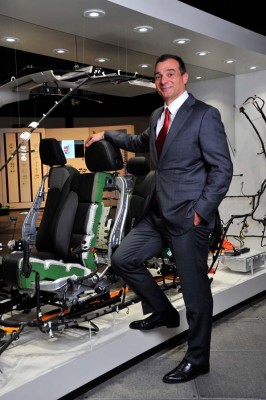
Years in HR: 31
Direct reports: 10
Indirect reports: 600
HR Differentiator: “Lear Corporation is a highly complex business and one of the top 100 employers based in the United States. We have an excellent record of retention and are able to attract and hire strong talent across the globe. That’s a testament to our culture and the quality of our company.”
Lear Corporation
Employees: 115,000
Headquarters: Southfield, MI
Locations: 221 in 36 countries
Many employees dread the annual review, that yearly session in a sterile conference room where they find out how they’ve performed over the past 12 months. A manager checks boxes or gives ratings while most employees receive an average score of “meets expectations.” Tom DiDonato believes that type of performance review is flawed. In fact, in his role as senior vice president of human resources for Lear Corporation, he has removed traditional performance ratings entirely.
Instead, Lear has developed a review process called “Talking Points,” where employees meet with their managers four times per year to discuss progress against goals, soft skills, and development plans linked to individual career aspirations. The move helps him attract, equip, and retain top talent at a massive organization whose 115,000 employees operate in 36 countries and generate $15 billion in sales.
DiDonato is not one to shy away from risks. He came to Lear almost two years ago after stints with Heinz, Philip Morris, Pepsico, and American Eagle. It was that last move—from packaged goods to retail—that helped DiDonato solidify his evolving HR philosophy. “I knew a job in fashion and retail would round me out in a really good way,” he says. “It’s fast-paced, centered on people, and very creative in nature.”
From there, DiDonato was forced to discover and build effective strategies for hiring creative employees. Instead of asking candidates their alma matter and GPA, DiDonato started using more probing questions to uncover true potential. “People might not be great at math, but maybe they really have an eye for color,” he explains. The approach helped him build a team capable of running attractive and efficient retail hubs filled with popular consumer items.
Moreover, the process has had an impact on DiDonato himself. “I have learned how to communicate and work with many different kinds of people with many different skill sets in many different industries,” he says. “I would never be where I am today if I hadn’t gained those diverse work experiences.”
Now, DiDonato finds himself again in a new sector. He leads 10 direct reports and 600 HR employees in a highly competitive global industry—and one in which he has never worked. Still, DiDonato knows his eclectic experience is an asset. “I would advise people in HR to get as many cultures and industries as possible under their belt,” he says. “Since I did that, I feel very comfortable with people who come at things with different approaches.”
Lear’s growth strategy centers on structure and talent, which DiDonato’s vast experience is helping find. DiDonato believes that by removing arbitrary—and often negative—performance reviews, he can help employees flourish. It’s important to note that he’s not removing accountability, but focusing on how to maximize strengths instead of highlighting weaknesses. “If you raise your kids and are constantly pointing out their weaknesses, I don’t think they’ll turn into a very good adult,” he remarks. “The same is true for an employee.”
For example, many managers rate an attribute like attention to detail on a scale of 1 to 10. Someone who is a 3, DiDonato argues, was probably a 3 in his adolescence. Instead of punishing an employee who scores a 3, an HR executive should instead match strengths to the correct role—effectively placing the 3 in a position where attention to detail is not critical. “Many of us in HR as an industry are focusing on weaknesses that don’t even matter,” DiDonato explains. “Anyone can point out what people don’t do well. What we really need is to figure out what is needed in a position, match the talent to the role, and continue to develop an employee’s strengths.”
DiDonato must cast a strong and clearly communicated vision that his team can implement throughout Lear Corporation. He’s worked with direct reports to create scorecards used to fill open positions. “They’re not job descriptions,” he says, “but a document that outlines exactly what must get done in a specific position.” For example, grow share by 5 percent, restructure a region, or build a sales force. Tangible and measurable results that create real benchmarks give employees targets to hit.
Still, creating a consistent function across 36 countries is no easy task. To do so, DiDonato relies heavily on regional leaders who are given the freedom to implement plans developed as a team based on the business goals at their discretion. “How each key player puts the plan into action is up to them, DiDonato says. “I don’t show Brazil exactly what to do, but I tell them we must hit certain goals. Then, they apply their own genius to how it gets down.” With all team leaders following an identical overriding strategy, results should be the same even if they are delivered through varying methods.
Once employees become part of Lear Corporation, DiDonato looks to provide support and room for growth. “Getting the right people to the right jobs is critical, and you’ll never attract them if you don’t have the culture to support them,” he says.
To do so, DiDonato looks for ambitious, aggressive candidates that are looking for advancement. “If you hire tigers, you better feed them,” he quips. Ambitious workers, after all, have high expectations. They need not only compensation, but a culture where they can develop, seize opportunities, and ultimately find a progressive and rewarding career path.
And that’s why DiDonato eliminated performance ratings. If four-fifths of a company’s employees receive average scores during performance reviews, then 80 percent of that company’s workforce is disappointed. That’s not the recipe for a strong culture. “Everyone feeling average is not inspiring at all,” DiDonato says. “Those other companies have it all backwards.”

